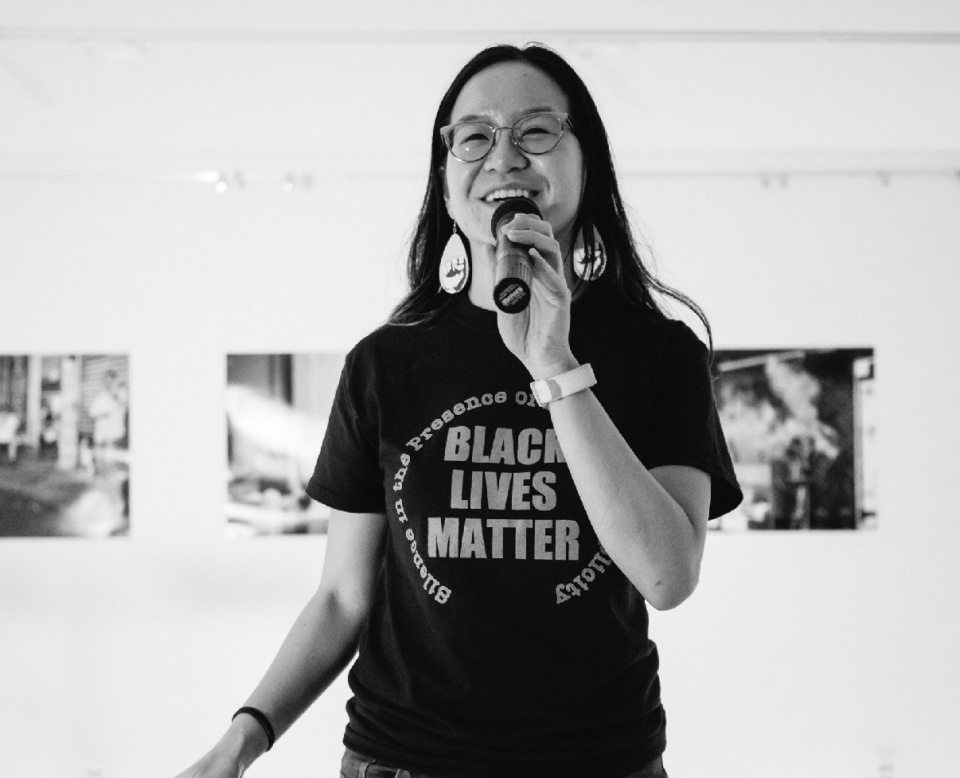Columbia College | Columbia University in the City of New York
Activist Annie Tan ’11 Is Speaking Up for Asian Americans

CINDY TRINH
Activist, storyteller and special education teacher Annie Tan ’11 knows how to make her voice heard, and how to inspire others to speak up. Most recently, this past May, Tan appeared on PBS’s five-part documentary Asian Americans, speaking both about her work as a teacher and her family’s role at the center of the modern push for Asian-American visibility and civil rights in the United States.
Tan’s journey to the national stage has been years in the making. When she was 13, she learned about a tragedy that had shaken her family to the core. In 1982, Tan’s cousin Vincent Chin was beaten to death by two Detroit autoworkers; the killers, who blamed the Japanese auto industry for declining U.S. auto sales, mistook Chin for being Japanese. The killers received only three years’ probation and a $3,000 fine. Chin’s mother, Tan’s great-aunt Lily Chin, spent the years after his death campaigning for hate crime legislation; she returned to China in 1987 after facing discrimination.
Tan has since taken up the family’s mantle, speaking about the case in various mediums. “[When] you hear about Vincent Chin in Asian-American studies textbooks,” she says, “you have a different reaction than when I’m in front of you telling you that my family had to fight that case for years and years, and lost over and over, to the point where my great auntie moved to China. It’s just very different to see it from my vantage point.”
In addition to Asian Americans, Tan has been featured on The Moth Radio Hour and has embraced storytelling as a way to communicate issues relating to Asian-American activism and experiences. She gave the keynote at the Teaching Social Activism conference at the Museum of the City of New York in May 2019 and has performed at live storytelling events around New York City. She also volunteers with CAAAV (Committee Against Anti-Asian Violence), an NYC-based organization that empowers and advocates for low-income Asian immigrants and refugees, and is involved in the United Federation of Teachers, the union that represents teachers who work in New York City public schools.
Tan, who grew up in Manhattan’s Chinatown, majored in urban studies at the College, while simultaneously earning her teaching license through Barnard. After graduation she moved to Chicago and began teaching in the majority Latinx Little Village neighborhood. She campaigned for teachers’ rights for two years as co-chair of the Special Education Committee of the Chicago Teachers Union. “We fought against hundreds of positions being cut illegally in Chicago public schools, and formed a special education task force, which is still active,” she says.
In 2016, Tan moved back to New York and sought out Brooklyn’s diverse Sunset Park neighborhood in order to teach its large number of Chinese and Latinx students. “I wanted to continue teaching bicultural students who had questions like, ‘What do I do when my mom and dad need me to translate and put this burden on me?’ — because I went through that,” she says. “It’s my job as a teacher to know where they came from and to give them some space to be kids. It’s a blessing; every day I see their confidence and motivation grow.”
Tan says her activism and teaching are inexorably linked: “Had I not been a teacher first, I don’t think I would have learned these lessons very well. I realized I have to model what I want my students to be. In order for my students to be in a better world and to be humans that will make this world better, I also have to be better. And that means I have to fight for them.”
Issue Contents
Published three times a year by Columbia College for alumni, students, faculty, parents and friends.
Columbia Alumni Center
622 W. 113th St., MC 4530, 6th Fl.
New York, NY 10025
212-851-7852
cct@columbia.edu
Columbia Alumni Center
622 W. 113th St., MC 4530, 4th Fl.
New York, NY 10025
212-851-7488
ccalumni@columbia.edu

